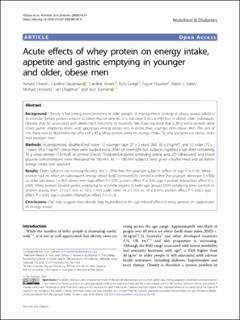| dc.description.abstract | Background
Obesity is becoming more prevalent in older people. A management strategy in obese, young adults is to increase dietary protein relative to other macronutrients. It is not clear if this is effective in obese, older individuals. Obesity may be associated with diminished sensitivity to nutrients. We have reported that a 30-g whey protein drink slows gastric emptying more, and suppresses energy intake less, in older, than younger, non-obese men. The aim of this study was to determine the effect of a 30 g whey protein drink on energy intake, GE and glycaemia in obese, older and younger men.
Methods
In randomized, double-blind order, 10 younger (age: 27 ± 2 years; BMI: 36 ± 2 kg/m²), and 10 older (72 ± 1 years; 33 ± 1 kg/m²), obese men were studied twice. After an overnight fast, subjects ingested a test drink containing 30 g whey protein (120 kcal) or control (2 kcal). Postprandial gastric emptying (antral area, 2D Ultrasound) and blood glucose concentrations were measured for 180 min. At t = 180 min subjects were given a buffet meal and ad libitum energy intake was assessed.
Results
Older subjects ate non-significantly less (~20%) that the younger subjects (effect of age, P = 0.16). Whey protein had no effect on subsequent energy intake (kcal) compared to control in either the younger (decrease 3 ± 8%) or older (decrease 2 ± 8%) obese men (age effect P > 0.05, protein effect P = 0.46, age × protein interaction effect P = 0.84). Whey protein slowed gastric emptying, to a similar degree in both age groups (50% emptying time: control vs. protein young men: 255 ± 5 min vs. 40 ± 7 min; older men: 16 ± 5 min vs. 50 ± 8 min; protein effect P = 0.001, age effect P = 0.93, age × protein interaction effect P = 0.13).
Conclusions
Our data suggest that obesity may blunt/abolish the age-related effect of whey protein on suppression of energy intake. | en_US |

